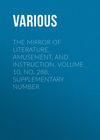Loe raamatut: «Mrs. Whittelsey's Magazine for Mothers and Daughters», lehekülg 20
PROMISES
"And though to his own hurt he swears,
Still he performs his word."
I was yet a boy, when one day a gentleman came into the lot where my father was superintending the in-gathering of his hay crop, and addressing himself to a mower in my father's employment, inquired whether he would assist him the following day. He replied, "Yes." "How is this," said my father; "are you not engaged to mow for me?" "O yes," said the man. "Why, then," continued my father, "do you promise to mow for Gen. K–?" "Why," said the man, "I wish to oblige him; I love to oblige everybody." "And so," said my father, "you are willing to incur the guilt of falsehood, for you cannot perform your promise to him and myself, and in the end you must disappoint one of us; and, maybe, seriously injure our interests and your reputation."
Nothing, surely, is more common, it is believed, than this heedless manner of making promises which cannot be fulfilled. The modes in which such promises are made are multitudinous, but it is not within the compass of this article to specify them. That they are utterly wrong, and indicate, on the part of those who make them, a light regard for truth, is obvious. Besides, they often lay the foundation for grievous disappointments, they thwart important plans, derange business calculations, give birth to vexatious feelings, cause distrust between man and man, and sap the foundations of morality and religion. Promises should always be made with due caution and due reservation: "If the Lord will," "if life is spared," "if unforeseen circumstances do not interpose to prevent." It is always easy to state some conditions, or make some such reservations. Or, rather, it would be easy, were it not that one is often urged beyond all propriety, to make the promise, as if the making of it, of course insured its fulfillment, although a thousand circumstances may interfere to prevent it.
This is a subject of vast importance to the community. There are evils also connected with it of alarming magnitude, and which all needful efforts should be made to remove. Especially should this subject attract the attention of parents. The mischief often begins with them and around their own hearths. How common it is for parents to make promises to their children, while the latter are yet tottering from chair to chair, which are never designed to be fulfilled. And, at length, the deception is discovered by the little prattlers, and often much earlier than parents imagine. Often, too, is the parent reminded of his promise and of its non-fulfillment. And, sometimes, this is done days and weeks after the promise has been made and neglected. The consequence is, that the child comes to feel that his parent has little or no regard to truth himself, and that truth is a matter of minor importance. So that child grows up. So he goes forth into society, and enters upon business. Will he be likely to forget the lessons thus early taught him, and the example thus early set him?
I am able to illustrate this subject by an incident which occurred in my own experience within the last two months. I must tell the story in my own simple way, and as it is entirely truthful, I hope salutary impressions may be made in every quarter where they are needed, and where this article shall be read.
Having occasion for the services of a mechanic in relation to a certain piece of work, I called upon one in my neighborhood, then in the employment of a gentleman, and was informed, on stating my object, that as he should be through with his present engagement on the evening of a certain day, he would commence my work on the following morning. The specified time arrived, but the man did not appear. I waited two or three days, in hourly expectation of his appearance, but was doomed to disappointment. At length, I again called upon him and found him still in the employment of the gentleman aforenamed. On inquiring the reason of his delay, I was informed that on completing his former engagement the gentleman had concluded to have more done than he originally intended, and insisted upon the continuance of the mechanic in his service until his work was entirely finished.
I said to him, "But did you not agree with me for a specified day?"
"Yes."
"Did not your engagement with Mr. – terminate on the evening previous to that day?"
"Yes."
"Were you under obligation to that gentleman beyond that time?"
"No."
"Did not your continuance with him involve a violation of your promise to me?"
"Yes."
"Was not this wrong? and how are you able to justify your conduct?"
"Sir," said he, "you do not understand the matter. I am to blame, but my employer is still more to blame. Look at it. I am a mechanic and a poor man. I am dependent on my labor for the support of myself and family. This gentleman is rich, and gives me a great deal of employment; I do not like to disoblige him, and, sir, when I told him, on the termination of my engagement to him, that I had promised to enter upon a piece of work for you, he would not release me. He claimed that I was in good faith bound to work for him till his various jobs were done."
"And did you think so, my friend?"
"No," he replied, "I did not; but he told me that if I did not stay he would give me no further employment."
"And so," said I, "you violated your conscience, wronged your own soul, disappointed me, and all for the sake of obliging a man who was willing that you should suffer in point of conscience and reputation, if his selfish purposes might be answered."
"I am sensible," said he, "that I did wrong, but what course shall we pursue, who are dependent upon our daily labor, for our support?"
"I admit," said I, "that you and others similarly situated, are under a grievous temptation. But honesty, in the long run, is the best policy. Acting upon the same principles with the gentleman who has detained you, I might hereafter refuse to employ you. And others might refuse, whose work you are probably engaged to perform, but are postponing to gratify him. The consequence of all this is, that your promises will soon pass for nothing. You will be considered as a man not of your word, and when once your good name is lost, you will become poorer than you now are, and remain without employment and without friends."
No one, it is believed, can read the foregoing incident without being impressed with the great impropriety chargeable upon the gentleman referred to. The temptation he spread before the poor mechanic was utterly wrong and unbecoming. It was nothing short of oppression. It was bringing his wealth to bear upon a point with which it had no legitimate connection. It was placing self before right; it was a reckless sacrifice of the interests of others for his own gratification.
That such cases are common, is well known; but their frequency is only a proof of the slight regard in which the sacredness of promises is held, and to the violation of which employers frequently contribute by the temptations which they spread, and the coercion which they practice. We do not justify for a single moment the mechanics and laborers who violate their pledges. We insist upon it that it is their solemn duty to encounter any and every temporal evil rather than sacrifice truth and conscience; but it is believed they would seldom be guilty of this violation were they not pressed beyond measure by employers.
We must for a moment again advert to parents. You see, friends, what an evil exists throughout the community. It is everywhere, and is helping to work the ruin of immortal souls. It often begins, it is believed, in the family. Parents are guilty, in the first place, and they early inoculate their children with the evil. And the infection, once taken, is likely to spread and to pervade the whole moral system. It enters into other relations of life. It reaches to other departments of duty, and tends to destroy our sense of obligation to God. It weakens our regard for promises made to the Author of our being. In short, this disregard for the fulfillment of sacred promises helps to sap the foundations of moral virtue, and to prepare the soul for a world where falsehood reigns supreme, and where there is no confidence between man and man.
Veritas.
Original
TRIALS
The Rev. Wm. Jay has sweetly said of the trials of the people of God: "Have they days of affliction? God knows them; knows their source, their pressure, how long they have continued, the support they require, and the proper time to remove them. Have they days of danger? He knows them, and will be a refuge and defense in them. Have they days of duty? He knows them, and will furnish the strength and the help they require. Have they days of inaction when they are laid aside from their work, by accident or disease? He knows them, and says to his servants under every privation, 'It is well that it was in thy heart.' Have they days of privation when they are denied the ordinances of religion, after seeing his power and glory in the temple, and going with the voice of gladness to keep holy day? He knows them, and will follow his people when they cannot follow him, and be a little sanctuary to them in their losses. Have they days of declension and of age in which their strength is fled, and their senses fail, and so many of their connection have gone down to the dust, evil days, wherein they have no pleasure? He knows them, and says, 'I remember thee, the kindness of thy youth. Even down to old age I am He, and to hoary hairs will I bear and carry you.'"
Original
THE YOUNG MEN'S CHRISTIAN ASSOCIATION
Our friend, Mrs. Sigourney, has, at our request, kindly sent us the subjoined hymn and remarks: "The Young Men's Christian Association I consider one of the very best designs of this age of philanthropy. I send you a hymn, elicited by the Boston branch of this same Society, a circumstance which will not, I hope, diminish its adaptation to your pages."
We cannot omit to ask mothers and daughters to give this Association their countenance and prayers. We trust it will be the means of accomplishing great good.
HYMN FOR THE "YOUNG MEN'S CHRISTIAN ASSOCIATION."
God of our children! hear our prayer,
When from their homes they part,
Those idols of our fondest care,
Those jewels of the heart.
We miss their smile in hall and bower;
We miss their voice of cheer;
We speak their names at midnight hour
When none but Thou dost hear.
God of their spirits! be their stay,
When from their parents' side,
Their boat is launched to find its way
O'er life's tempestuous tide.
Tho' toss'd 'mid breakers wild and strong,
Its veering helm should stray
Where syrens wake the mermaid song,
Guide thou their course alway.
Oh, God of goodness, bless the band
Who, moved by Christian love,
Take the young stranger's friendless hand
And lead his thoughts above.
May their own souls the sunbeam feel,
They thus have freely given,
And be the plaudit of their zeal
The sweet "well-done" of heaven.
L.H.S.
Original
THE MOTHERS OF THE BIBLE
NAOMI AND RUTH
It would be only presumption in us to attempt giving in any other than the beautifully simple words of Scripture the story of Ruth and her mother-in-law. The narration is inimitable, and needs nothing to make it stand out like a picture before the mind. Suffice it then that we now attend only to the lessons which may be gathered from it, and endeavor to profit by them through all our coming lives. Nor let any think the lessons afforded by these four short chapters few or easily acted upon, though they may be soon comprehended. They will amply reward earnest study and persevering practice.
The first thing which wins our admiration is Ruth's faith. She had been educated in the degrading worship of Chemosh, the supreme deity of Moab. Probably no conception of the one living God had been formed in her mind until her acquaintance with the Jewish youth, the son of Elimelech and Naomi. How long she had the happiness of a wife we are not informed. We know it was only a few years. But during that period she had learned to put such confidence in Jehovah, that she was willing to forsake country and friends, even the home of her childhood and beloved parents, and go forth with her mother-in-law to strange scenes, and willing to brave penury and vicissitude that she might be numbered among His people. Firmly she adhered to her resolution. The entreaties of Naomi—the thought of her mother—the prospects which might await her in her own land—even the retreating form of Orpah—nothing had power to prevail over her desire to see Canaan and unite in the worship of her husband's God. "The Lord recompense thy work," said Boaz to her, "and a full reward be given thee of the Lord God of Israel, under whose wings thou art come to trust." He is not unfaithful, and that reward was made sure. "Of the life that now is," the promise speaks, and it was fulfilled to her. Of an undying honorable name it says nothing, but that is also awarded her. "Upon a monument which has already outlasted thrones and empires, and which shall endure until there be a new heaven and a new earth—upon the front page of the New Testament is inscribed the name of Ruth. Of her came David—of her came a long line of illustrious and good men—of her came Christ."
Why will we not learn—why will we not daily and constantly act upon the truth that implicit faith is pleasing to God? "None of them that trust in Him shall be desolate."
There is a fund of instruction also in the few glimpses which we gain of the intercourse of Naomi and Ruth as they journey on and after their arrival in Canaan. How does the law of love dictate and pervade every word and action! Naomi had once been an honored wife and mother in Judah, and far above the reach of want. But in "the days when the judges ruled," those days during which "every man did what was right in his own eyes," her husband had deserted his people; and now on her return she was probably penniless, her inheritance sold until the year of jubilee, and she in her old age, unable by her own efforts to gain a subsistence. The poor in Israel were not forlorn, but it required genuine humility on Ruth's part, and a sincere love for her mother-in-law, to induce her to avail herself of the means provided. She hesitated not. It was "in the beginning of the barley harvest" that they came to Bethlehem, and as soon as they were settled, apparently in a small and humble tenement, she went forth to glean in some field after the reapers, not knowing how it would fare with her, but evidently feeling that all depended on her labors. The meeting of the mother and daughter at the close of that important day is touching indeed. The joy with which the aged Naomi greets her only solace, and the kind and motherly care with which she brings the remains of her own scanty meal, which she had laid aside, her eager questions, and Ruth's cheerful replies as she lays down her burden and relates the pleasant events of the day—what gratitude to God—what dawning hopes—what a delightful spirit of love appear through all! And as days pass, how tenderly does Naomi watch over the interests of her child, and how remarkable is the deference to her wishes which ever animates Ruth. Even in the matter of her marriage,—a subject on which young people generally feel competent to judge for themselves,—she is governed entirely by her mother's directions. "All that thou sayest unto me I will do." Said a young lady in our hearing, not long since, "When I am married I shall desire that my husband may have no father or mother." This is not an unusual wish, nor is it uttered in all cases lightly and without reason. We know of a mother who would never consent that her only son should bring his wife to dwell under her roof, although she was entirely satisfied with his choice, and was constantly doing all in her power to promote their happiness. What were her reasons? She was a conscientious Christian and fond mother, but she would not risk their mutual happiness. She felt herself unable to bear the test, and she was unwilling to subject her children to it. Often do we hear expressions of pity bestowed on the young wife who is so "unfortunate" as to be compelled to live with her mother-in-law, and many are the sighs and nods and winks of gossip over the trials which some of their number endure from their sons' wives. Why is all this? The supreme selfishness of our human nature must answer. Having a common love for one object, the mother for her son, the wife for her husband, they should be bound by strong ties, and their mutual interests should produce mutual kindness and sympathy, and this would always be the case if each were governed by the spirit of the Gospel. But alas! love of self rather than the pure love inculcated by Jesus Christ most often rules. Brought together from different paths, unlike, it may be, in natural temperament, perhaps differing in opinion, the mother wishing to retain her wonted control over her son, the wife feeling hers the superior claim, there springs up a contest which is the fruitful source of unhappiness, and which mars many an otherwise fine character. Before us in memory's glass as we write, sits one of a most fair and beautiful countenance, but over which hang dark clouds of care, and from the eyes drop slowly bitter tears. She is what all around her would call a happy wife and mother. Fortune smiles upon her, and the blessing of God abides by the hearth-stone. Her husband is a professing Christian, as is also his yet youthful-looking mother and the wife herself. Beautiful children gambol around her, and look wonderingly in her face as they see those tears. What is the secret of her unhappiness? She deems hers a very hard lot, and yet if we rightly judge, could her sorrow be resolved to its elements, it would be found that the turmoil of her spirit is occasioned solely by the fact that she finds it hard to maintain her fancied rights, her desired superiority over her husband and servants, because of the presence of her calm, firm, dignified mother-in-law, whose very lips seem chiseled to indicate that they speak only to be obeyed. What would be the result if the tender, considerate love of Naomi and the yielding spirit of Ruth were introduced to the bosom of each?
We cannot leave this record of Holy Writ without commenting also on the remarkable state of society which existed in Bethlehem in those far distant days. When Naomi returned after an absence of ten years—an absence which to many might have seemed very culpable—with what enthusiastic greetings was she received. "The whole city was moved." It made no difference that she "went out full but had returned empty;" nor did they stop to consider that "the Lord had testified against her." The truest sympathy was manifested for her and for the stranger who had loved her and clung to her. In her sorrow they clustered around to comfort her, and when the bright reverse gave her again an honored name and "a restorer of her life" in her young grandson, they were eager to testify their joy. The apostolic injunction, "Rejoice with them that do rejoice, and weep with them that weep," seems to have been strictly obeyed in Bethlehem. The distinctions of society, although as marked apparently as in our own time, seem not to have caused either unhappiness nor the slightest approach to unkind or unchristian feeling. Witness the greeting between Boaz and the reapers on his harvest field. "And behold Boaz came from Bethlehem and said unto the reapers, The Lord be with you. And they answered him, The Lord bless thee." Boaz was "a mighty man of wealth;" he had his hired workmen around him, and in the same field was found the poor "Moabitish damsel," gleaning here and there the scattered ears, her only dependence. Yet we find them all sitting together in the hut which was erected for shelter, and eating together the parched grain which was provided for the noon's refreshment, while Boaz enters into a conversation with Ruth which indicates his truly noble and generous character, and speaks words which are like balm to the sorrowing spirit. "Thou hast comforted me and spoken to the heart of thy handmaid," she said as she rose to leave the tent and felt herself no longer a stranger, since one so excellent and so exalted in station appreciated and sympathized with her. We see little in these Gospel days and in this favored land which will compare with the genuine kindliness which breathes in every word and act recorded in the book of Ruth.
But the most surprising revelation is made in the account which follows the scene in the tent. What exalted principle—what respect for woman—what noble virtue must have characterized those among whom a mother could send her daughter at night to perform the part assigned to Ruth, apparently without a fear of evil, and receive her again, not only unharmed, but understood, honored, and wedded by the man to whom she was sent, and that notwithstanding her foreign birth and dependent situation, and fettered with the condition that her first-born son must bear the name and be considered the child of a dead man!
We have friends who will fasten their faith on the New Testament only, and can see nothing in the Old akin to it in precept or spirit. We commend to them the Book of Ruth.














![Birds and Nature Vol. 11 No. 5 [May 1902]](https://cdn.litres.ru/pub/c/cover_100/25570807.jpg)





